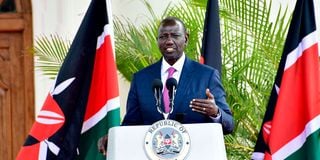Premium
Street tax agents are coming: Ruto gets Sh1.2bn boost to deploy KRA in markets

President William Ruto.
The National Assembly’s Budget and Appropriations Committee (BAC) has proposed an extra Sh1.2 billion to the recurrent budget of the Kenya Revenue Authority (KRA) to employ tax assistants as President William Ruto tightens the noose on “hustlers” who have in the past not been paying tax.
The committee recommended adjustments to the National Treasury’s general administration planning and services budget to accommodate the funding for the hiring of the agents as the government implemented new measures targeting Kenyans in the informal and agriculture sectors.
“Increase Sh1.2billion (recurrent) for KRA to employ tax assistants,” the BAC said in a report to the full House.
The Treasury in the Budget Policy Statement (BPS) for 2023 indicated that there is a potential to net Sh2.8 trillion in revenue from the unexplored Micro, Small, and Medium Enterprises (MSMEs) sector tax base.
A newly published National Tax Policy (NTP)-- which is to guide Kenya’s taxation framework for at least three years—targets a unified collection of taxes, levies, and fees and sharing of information between the national and county governments, which would see more people who haven’t been paying taxes netted, as well as existing collection loopholes filled.
In the policy guidelines on hard-to-tax sectors, Treasury proposed to go hard on agriculture and informal sectors, to increase tax yields.
“To achieve this objective, the government will explore ways of enhancing taxation of informal sectors including through increasing presence in big towns and cities and explore the mechanism for collecting taxes from the informal sector such as the appointment of tax collection agents,” the Policy states.
Education programmes
It also proposes rolling out education programmes to farmers and informal sector groups on taxation and to “require farmers and informal sector players to register with respective sub-sector associations and co-operative societies.”
This is besides a strong drive to ensure that counties and the national governments share information that will help bring more potential taxpayers on board, as the government strives to grow collections.
Tax, levies, and fee collection could also be done at a central point soon as opposed to currently where county and national governments run a different set of collection channels, with the Policy requiring a progressive shift from the current framework.
“Progressively adopt a unified system for collection of taxes, fees, and levies for the national and county governments,” the NTP states.
This plan would bring changes in many areas where counties are currently collecting taxes, fees, and levies, including parking fees, and business licenses such as single business permits and cess.
It would also bring changes in the counties’ Own Source Revenue (OSR) where most of the devolved units have been highly underperforming and have poor capacities in their own revenue collection that have not yielded much from their rich resources.
The Commission on Revenue Allocation last year released a report indicating that while Kenya’s 47 county governments had the potential to collect Sh216 billion annually, they were collecting a mere Sh31 billion, an underperformance of over 80 per cent.
The government is under pressure to collect at least Sh535 billion in taxes in the remaining two months to the end of the 2022/23 financial year, as the KRA collected just Sh1.57 trillion in taxes by the end of April.
This will be a hard task for the taxman, since the Sh535 billion it has to collect to hit the Sh2.1 trillion target as contained in the budget, is 70 per cent higher than the average collection over the 10 months to April.





